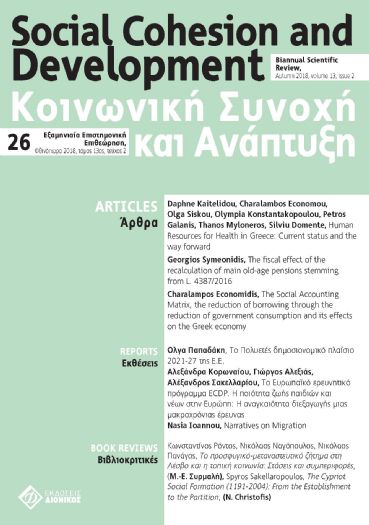The Social Accounting Matrix, the reduction of borrowing through the reduction of government consumption and its effect on the Greek economy

Published:
Jan 19, 2021
Keywords:
Input-Output Table Input-Output Analysis Sectoral Analysis and Social Accounting Matrix Greek Economy
Abstract
The aim of this paper is to calculate the impact of the reduction or elimination of net borrowing on the Greek economy. The assumption made for this calculation is that a reduction of net borrowing leads to a reduction of government consumption. The effects on the Greek economy of reducing borrowing are calculated by using the Social Accounting Matrix. The results show that a reduction of borrowing must be replaced by a significant increase in production and the resulting reductions relate primarily to sectors in which the state has sizeable participation, such as education, health, security, public administration and defence services.
Article Details
- How to Cite
-
Economidis, C. (2021). The Social Accounting Matrix, the reduction of borrowing through the reduction of government consumption and its effect on the Greek economy. Social Cohesion and Development, 13(2), 139–158. https://doi.org/10.12681/scad.25847
- Issue
- Vol. 13 No. 2 (2018)
- Section
- Articles

This work is licensed under a Creative Commons Attribution-NonCommercial-ShareAlike 4.0 International License.
Authors who publish with this journal agree to the following terms:
- Authors retain copyright and grant the journal right of first publication with the work simultaneously licensed under a Creative Commons Attribution Non-Commercial License that allows others to share the work with an acknowledgement of the work's authorship and initial publication in this journal.
- Authors are able to enter into separate, additional contractual arrangements for the non-exclusive distribution of the journal's published version of the work (e.g. post it to an institutional repository or publish it in a book), with an acknowledgement of its initial publication in this journal.
- Authors are permitted and encouraged to post their work online (preferably in institutional repositories or on their website) prior to and during the submission process, as it can lead to productive exchanges, as well as earlier and greater citation of published work (See The Effect of Open Access).
Downloads
Download data is not yet available.
References
Aray H., Pedauga L. and Velazquez A., (2017), “Financial Social Accounting Matrix: a useful tool for understanding the macro-financial linkages of an economy”, Economic Systems Research, Vol. 29, N. 4, December.
Economides A. and Economidis Ch., (2017), The Social Accounting Matrix as an economic policy tool for addressing the economic crisis, 2nd International Scientific Conference, “Reconstruction in Greece: Economic Crisis and Growth Perspectives”, 5-6 May 2017, Serres, Greece [in Greek].
Economidis Ch. and Economides A., “Using the Social Accounting Matrix to understand the Greek economic crisis”, East-West Journal of Economics & Business (pending publication).
Eurostat (1996), European System of Accounts 1995, Office for Official Publications of the European Communities, Luxembourg.
Miller R. and Blair P., (2009), Input–Output Analysis Foundations and Extensions, Second Edition, Cambridge University Press, Cambridge.
Panethimitakis A., (1991), Greek Manufacture, Sectoral Multipliers of Social Accounting Matrices and Structural path analysis for 1975, Athens University, Centre of Economic Research and Documentation, Gutenberg.
Pyatt G. and Round J., (1979), “Accounting and Fixed Price Multipliers in a Social Accounting Matrix Framework”, The Economic Journal, Vol. 89, No. 356.
Round J., (1988), “Incorporating the International Regional and Spatial Dimension into a SAM: Some Methods and Applications”, in: Harrigan F. J. and McGregor P. G., (eds), Recent Advances in Regional Economic Modeling, London: Pion.
Research Bulletin XB 1027 (1993), SAM Multipliers: Their Decomposition, Interpretation and Relationship to Input-Output Multipliers, Washington State University, College of Agriculture and Home Economics Research Center.
Santos S., (2004), “Portuguese net borrowing and the government budget balance: A SAM approach”, Journal of Policy Modeling, Volume 26, issue 6, September 2004, p.p. 703-717.
Santos S., (2003), Social Accounting Matrices for Portugal in 1998-99. Modeling the effects of changes in government receipts and expenditure, Higher Institute of Economics and Business Administration (Working Paper No 07/2003). Lisbon: Department of Economics, Research Unit on Complexity in Economics.
Sarris A., Zografakis S. and Karfakis P., (2004), Macroeconomic and Redistributional Impacts on the Greek Economy from a Reform of the Tax System: Empirical Analysis with the use of a Multisectoral General Equilibrium Model, Series: Studies, Centre of Planning and Economic
Research (KEPE), No. 54.
Stone R., (1985), “The Disaggregation of the Household sector in the National Account” in: Pyatt G. and Round J., (eds), Social Accounting Matrices. Basis for Planning, Washington, DC: World Bank.
Skountzos T., Touribabas N., Livas P., Mattheos G. and Anastassakou Z, (1985), Social Accounting Matrix for the Greek Economy for Year 1975, Athens: Centre of Planning and Economic Research (KEPE) [in Greek].
Zografakis S. and Spathis P., (2010), The end of fiscal deviations and their implications. Meeting The Greek labor market: features, developments and challenges (2/3/2010). Bank of Greece [in Greek].


